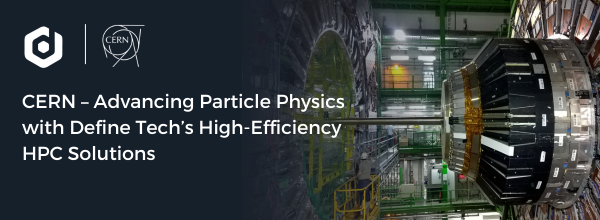CERN’s groundbreaking research into particle physics generates an immense volume of data, requiring advanced computational infrastructure to support over 17,000 scientists worldwide. To power complex simulations, event reconstruction, and large-scale data analysis, CERN must continually upgrade its High-Performance Compute (HPC) infrastructure – without compromising on power efficiency or reliability.
Define Tech is a global provider of advanced computing infrastructure, specialising in high-performance clusters, AI systems, and sustainable data centre solutions. Headquartered in London, Define Tech Ltd. delivers end-to-end services – from design to deployment – helping organisations across research, industry, and government accelerate their most demanding workloads.
What did CERN need?
In 2022, CERN issued a competitive tender for over 900 compute nodes to be deployed in its new data centres. These systems were to meet strict performance, efficiency, and total cost of ownership requirements across a five-year lifespan.
Why were Define Tech best placed to help?
Define Tech was selected for its expertise in designing HPC solutions optimised for both academic and industrial workloads. With a proven track record in delivering complex systems at scale, Define Tech proposed a solution based on Supermicro’s high-density BigTwin platform, powered by AMD EPYC processors.
Define Tech built and tested a sample system, from its UK technical facility, running benchmark tests provided by CERN to validate compute performance and power usage. The solution was engineered not only for raw power, but for total cost-efficiency, with careful tuning to meet CERN’s stringent performance-per-watt and long-term operational criteria.
After a rigorous evaluation process, CERN selected Define Tech’s solution – citing superior benchmark results, lower-than-expected power draw, and an efficient shared cooling and power design that optimised data centre density and uptime.
“We have worked alongside Supermicro for many years, and their attention to the design and engineering of the Supermicro BigTwin architecture has constantly increased. Thousands of compute nodes of the latest AMD EPYC based Supermicro BigTwin platform were deployed in the CERN computing facilities. This illustrates the high-quality of these systems, both in terms of performance and reliability.”
Eric Bonfillou of the CERN IT Facility Planning and Procurement
What’s it like working with CERN?
Define Tech has collaborated with CERN on various projects, providing support to multiple teams across the organisation. The ability to meet CERN’s stringent technical and procurement requirements has elevated Define Tech’s reputation across the European research and education sector.
“Working with CERN isn’t without its challenges – the technical and procurement requirements are among the most rigorous in the world. But that’s exactly what makes it so rewarding,” says Sam Ashdown, Commercial Director AI & HPC at Define Tech.
“Collaboration with CERN has increased Define Tech’s visibility within the research sector, creating opportunities to engage with other potential customers. The CERN team are exceptional collaborators; there’s a strong sense of partnership, and a shared commitment to solving complex problems together, and it’s a privilege to contribute to a strategic relationship that’s helping push the frontiers of scientific discovery.”
What was the impact on Define Tech?
Sam says, “Working with CERN has given us valuable experience and visibility, helping us approach new markets. We’ve also been engaging with physics researchers across the UK, including GridPP, who are interested in the design principles developed during this project.”
There are also wider-reaching benefits, because of its success with CERN, Define Tech was added to Supermicro’s UK framework, enabling faster delivery of turnkey solutions to universities and research institutes across the region.
Beyond the commercial wins, the collaboration brings a deep technical benefit. “Every system we deliver for CERN is the result of rigorous analysis and deep performance tuning,” says Sam. “It sharpens our internal capability and keeps us at the forefront of HPC design.”
Original post via LinkedIn. If you are interested in simplified IT management, scalable HPC resources, accelerated workloads and faster time to insight, talk to us today.

